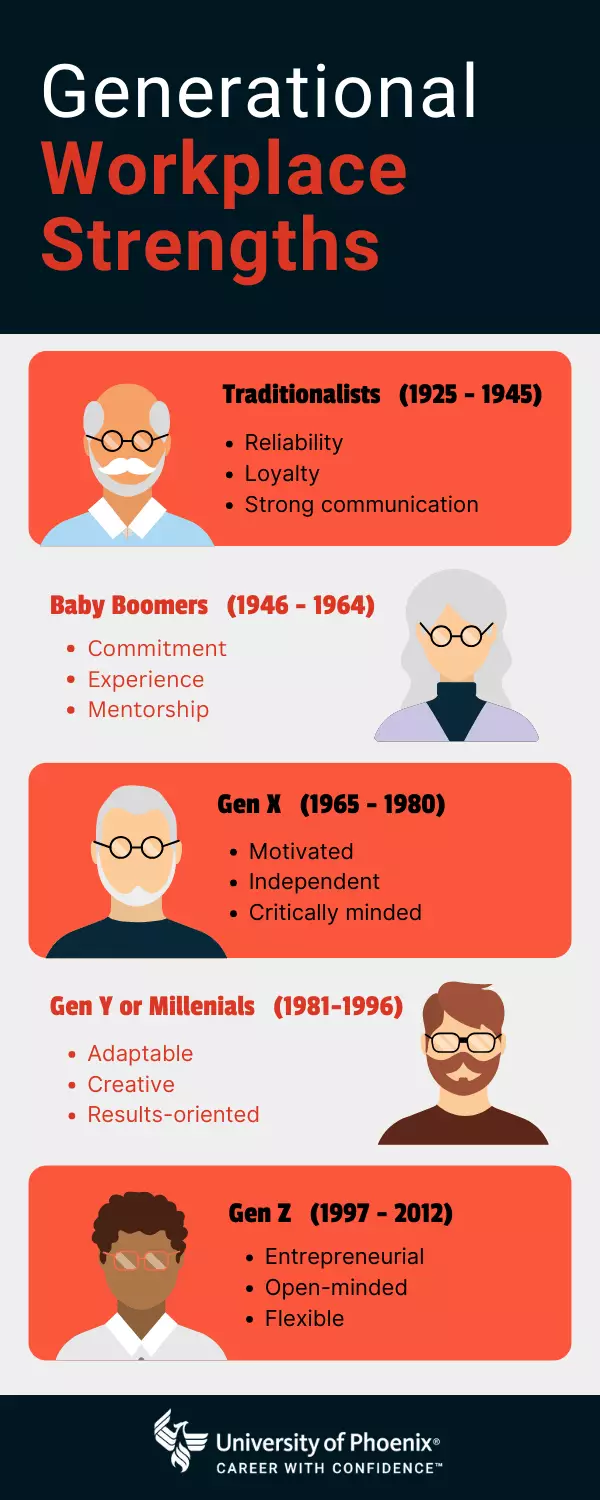Breaking down generational differences in the workplace
This article was updated on December 4, 2023.

Written by Elizabeth Exline

Reviewed by Jessica Roper, MBA, director of Career Services at University of Phoenix

If watercoolers still existed, you’d find up to five generations gathered around them these days. There are the boomers and the millennials, of course. But Gen X, Gen Z and even traditionalists are all clocking in too, which makes now a historic first that translates to both opportunity and challenge.
“There’s a lot of focus right now on diversity, equity and inclusion,” observes Ricklyn Woods, SHRM-SCP, a career advisor at University of Phoenix. “But a lot of times, that’s only viewed through the lens of race. When you think about different perspectives and different experiences, having five generations in the workplace gives you a good amount of diversity … of thought.”
And diversity of thought offers a tantalizing opportunity to grow, no matter which generation you belong to.
What are the give generations?
If you can’t name all the different generations currently at work, you’re not alone. Here’s your cheat sheet:
- Traditionalists (aka the Silent Generation): born between 1925 and 1945
- Baby boomers (everyone’s favorite scapegoat): born between 1946 and 1964
- Generation X (this is the one you probably forgot): born between 1965 and 1980
- Millennials (everyone’s second-favorite scapegoat): born between 1981 and 2000
- Generation Z (bucket hats for everyone!): born between 2001 and 2020
The best (of each) generation
There’s a reason comedy sketches on generational differences are so popular. Generalizations, while not a science nor 100% accurate, can resonate with people. The humor lies in that liminal space between distinction (what makes each generation different) and self-awareness (what makes each generation mildly ridiculous).
And each generation’s strengths? Well, that’s where you’ll find the gold.
Before diving into that, however, an obligatory disclaimer. The following is an overview. Not every quality applies to everyone. But this roundup of data and insight does serve to illustrate how we all might begin to understand and learn from one another.
Traditionalists
According to the Pew Research Center, traditionalists made up 2% of the workforce in 2017, the latest year for which numbers are available. That they were still part of the workforce in any number speaks to perhaps their greatest strength: dependability.
This is the generation that survived the Great Depression, lived through World War II, witnessed the rise of the Soviet Union, and went on to build careers and institutions that form the foundation of modern-day society.
What’s more? Some are still working.

“I actually have an aunt who worked until she was in her mid- to late 70s,” Woods says. “She worked at a grocery store, and she was not in a leadership position. … A lot of times, [traditionalists] are not in a hurry to retire. They want to continue to work because it gives them something to do, and they’re proud of the work they do and oftentimes proud of the organizations they work for.”
Workplace strengths: Reliability, loyalty and strong communication
Baby boomers
It’s easy to hate on boomers when they’ve reaped the advantages of the Silent Generation (peace and prosperity) and recovered relatively well from economic tribulations like the dot-com bubble and the 2008 recession.
But boomers have paid their dues too. Like their predecessors, boomers have demonstrated considerable loyalty to their employers, even if that loyalty was born from a sense of duty.
“Baby boomers know they’re very fortunate to have the opportunities they’ve been given,” Woods says. “So, because of what prior generations went through to afford those opportunities, there’s this sense of, ‘I gotta stick it out. I have to have longevity with a particular company.’”
Seniority (and its perks) are tied to that longevity, which means that baby boomers may view success as a natural consequence of hard work. They have experience younger generations can learn from, and the communication skills to offer real value in mentorship.
One aspect of boomers that often draws a lot of disparaging attention is their cooler attitude toward technology. Woods has seen a version of this in her mother whom, she says, uses technology but doesn’t love it. And that has some positive repercussions.
“I think it is the boomer generation that really keeps us grounded in some human connection and interaction by using less technology. Even Gen X, we’ve adapted. We tend to adopt new technology … but definitely the baby boomers are like, ‘I want to still talk to the grocery store clerk,’” Woods says.
Workplace strengths: Commitment, experience, mentorship
Gen X
Notable perhaps for being the most forgotten (not forgettable!) generation, Gen Xers have never really dominated the workplace. According to that previously cited Pew Research Center data, Gen X was outnumbered by boomers in 1994 (50% versus 29% of the U.S. workforce) and by millennials in 2017 (35% versus 33%).
Though relatively small in size, Gen X has been mighty in terms of accomplishments. They are the most highly educated generation, with 35% of them having college degrees (as opposed to 19% of millennials) and the most entrepreneurial: 55% of startup founders are Gen X.
Chalk it up to latchkey youths, MTV or the absence of the internet while growing up, but Gen X seems to bring the best of both independence and motivation to the workplace.
With that can-do spirit comes a certain willingness to challenge authority, Woods says. “We will try to knock down doors and barriers more where I think baby boomers tend to go along to get along,” she explains.
This explains Gen X’s penchant for recognizing and pursuing opportunities other generations might not. And while Gen X cannot be considered “digital natives” the way younger generations are, they were at the forefront of that movement and have benefited accordingly.
“We have access to more information and knowledge than prior generations [did] … and we’ve been able to utilize that information to empower us in the workplace. We understand that we don’t have to settle for certain things. We can also pursue certain goals without feeling limited or stifled,” says Woods, herself a Gen Xer. “When you know better, you do better.”
Workplace strengths: Motivated, independent, critically minded
Millennials
Remember those digital natives? Well, the first generation to earn that title was the millennials, and the impact has been profound.
“If you think about the job-search process, the baby boomer generation was limited to newspaper ads,” Woods says. “So, I think from an empowerment standpoint, we’re in a position to take better control of our careers.”
And many millennials have done just that. Where baby boomers value longevity and seniority, and where Gen X values flexibility and autonomy, millennials have shifted the conversation toward finding meaning and fulfillment in a career.
“We weren’t talking about fulfillment,” says Woods. “You worked until you retired, and then your time there was done. But now there are more people talking about what it means not just to work, not just to plan for retirement, but to really make meaningful contributions.”
Woods hypothesizes that much of this millennial outlook stems from a certain degree of privilege. “They didn’t have to struggle in the same way that prior generations did,” she says. “So, how it shows up in the workforce is entitlement. … But it’s really about empowerment, not entitlement.”
This can be present a number of ways, from a drive to achieve to a commitment to creating a healthy work-life balance.
If you’re still not convinced of millennials’ potential to change things for the better, and if you’re of an older generation, Woods has one piece of advice:
“Gen Xers were latchkey children. Not millennials. Millennials had car pickup and lunch brought to them. … Well, I love hearing people talk about the millennial generation, because a lot of times it’s us Gen Xers who are complaining about them, yet this is the generation that we’ve raised.”
Instead of “Us against them,” in other words, try thinking, “We’re all connected.”
Workplace strengths: Adaptable, creative and results-oriented
Gen Z
As the newest generation to enter the workforce, Gen Z finds itself suffering from the traditional hazing and growing pains every generation experiences at the outset. But before you extend judgment anyway, spare a thought for the new hires who’ve only ever known virtual meetings and remote work.
“Should we shift back at any point to where we’re going into offices more, imagine what they will go through making that adjustment,” Woods says.
They will still likely rely on the technology they’ve been raised with since they were old enough to sit up in a stroller with a tablet. “They’re on it 24/7,” Woods says, noting that most of Gen Z’s communication happens digitally. (Sometimes to their detriment, as those who shell out money for phone lessons well know.)
That digital prowess also primes Gen Z for the sort of entrepreneurial opportunities Woods has seen them master. “They’re coming up in this time of gig work where they have options,” she says. “There are more ways to make money these days than there ever have been. Even those who are pursuing a college degree may still opt to be more entrepreneurial than going to work.”
Workplace strengths: Entrepreneurial, open-minded, flexible
Generational BFFs
People from different generations have much to learn from one another, as underscored by a recent Accenture survey. In looking at Gen Z employment trends, the study revealed that Gen Z has more in common with Gen X than might be assumed.
“Gen Z resembles its parent generation Gen X more than its millennial predecessors,” the report’s authors note. “New grads are looking for an employee experience that is tailored for them.”
Like Gen X, Gen Z is more ready and willing to work for a big company, move for a job and stay on with an employer for five or more years. In return, the Accenture report notes, they expect work-life balance, meaningful work, and mentorship and skills training.
That’s just one connection, but the potential is there for other mutually beneficial relationships.
“From an employee development perspective, I think you need to intentionally identify mentors who have many years of work experience and wisdom to impart to the next generation,” Woods explains. “Invite Gen Xers, millennials and Gen Z to help bridge the gap in areas where technology may be a challenge for others. Instead of ignoring the fact there are multiple generations in the workplace, embrace it and leverage it.”
While all this sounds great in theory, not every generational difference can be embraced as quaint or charming. Different styles of communication, different ideas of what’s valuable to share and even different vocabulary (looking at you, thumbs-up emoji!) mean there are plenty of opportunities for hurt feelings or resentment.
To this, Woods extols the virtues of open-mindedness. Basically, take a deep breath, look at the conflict from your older or younger co-worker’s point of view and reconsider.
“Older generations may need to unlearn some of the behaviors they’ve learned,” Woods posits. “If they’re open to it, and if younger generations are also open to it, being able to see things from a different person’s perspective can potentially be beneficial to you. It creates a culture of open-mindedness.”
And that’s something we can all learn from.
Read more articles like this:

ABOUT THE AUTHOR
Elizabeth Exline has been telling stories ever since she won a writing contest in third grade. She's covered design and architecture, travel, lifestyle content and a host of other topics for national, regional, local and brand publications. Additionally, she's worked in content development for Marriott International and manuscript development for a variety of authors.

ABOUT THE REVIEWER
Jessica Roper, University of Phoenix director of Career Services, is a seasoned leader with over 15 years of experience in leadership within higher education. She has honed her expertise in student services and career development and is passionate about helping others discover and refine their skills.
This article has been vetted by University of Phoenix's editorial advisory committee.
Read more about our editorial process.



